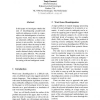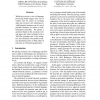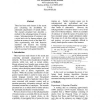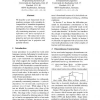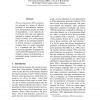ACL
2001
14 years 28 days ago
2001
This paper addresses recent progress in speaker-independent, large vocabulary, continuous speech recognition, which has opened up a wide range of near and mid-term applications. O...
ACL
2001
14 years 28 days ago
2001
In this paper we investigate whether the task of disambiguating pseudowords (artificial ambiguous words) is comparable to the disambiguation of real ambiguous words. Since the two...
ACL
2001
14 years 28 days ago
2001
While the generative view of language processing builds bigger units out of smaller ones by means of rewriting steps, the axiomatic view eliminates invalid linguistic structures o...
ACL
2001
14 years 28 days ago
2001
There has been much interest in the recent past concerning the possibilities for automated categorization of named entities. The research presented here describes a method for the...
ACL
2001
14 years 28 days ago
2001
This paper presents methods for a qualitative, unbiased comparison of lexical association measures and the results we have obtained for adjective-noun pairs and preposition-noun-v...
ACL
2001
14 years 28 days ago
2001
We describe a new framework for dependency grammar, with a modular decomposition of immediate dependency and linear precedence. Our approach distinguishes two orthogonal yet mutua...
ACL
2001
14 years 28 days ago
2001
In a language generation system, a content planner embodies one or more "plans" that are usually hand
ACL
2001
14 years 28 days ago
2001
Current alternatives for language modeling are statistical techniques based on large amounts of training data, and hand-crafted context-free or finite-state grammars that are diff...
ACL
2001
14 years 28 days ago
2001
Polarized dependency (PD-) grammars are proposed as a means of efficient treatment of discontinuous constructions. PD-grammars describe two kinds of dependencies : local, explicit...
ACL
2001
14 years 28 days ago
2001
We present a machine learning approach to evaluating the wellformedness of output of a machine translation system, using classifiers that learn to distinguish human reference tran...

